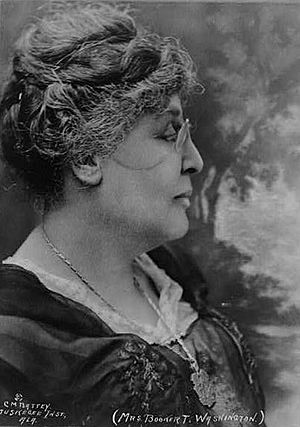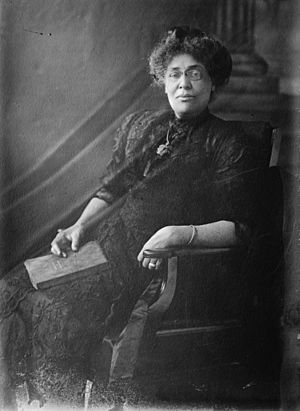Margaret Murray Washington facts for kids
Quick facts for kids
Margaret Murray Washington
|
|
|---|---|

Washington in 1915
|
|
| Born |
Margaret Murray
March 9, 1865 |
| Died | June 4, 1925 (aged 60) |
| Known for | anti lynching activism |
| Spouse(s) | Booker T. Washington |
Margaret Murray Washington (born March 9, 1865 – died June 4, 1925) was an important American educator. She was the principal of Tuskegee Normal and Industrial Institute, which is now Tuskegee University. She also led many women’s clubs. She was the third wife of the famous educator Booker T. Washington. In 1972, she was honored by being added to the Alabama Women's Hall of Fame.
Contents
Biography
Margaret Murray was born on March 9 in Macon, Mississippi. Her exact birth year is a bit unclear. Her tombstone says 1865, but other records suggest 1861. She was one of ten children. Her parents were sharecroppers, who farmed land owned by someone else. Her father was an Irish immigrant, and her mother was a Black American washerwoman.
Margaret's father died when she was seven. The next day, she moved to live with a Quaker couple named Sanders. Quakers are a religious group known for their peaceful beliefs. The Sanders family encouraged Margaret to become a teacher. This was one of the few jobs available for women at that time.
As a child, Margaret loved to read and did very well in school. By age fourteen, she was so good at her studies that the school offered her a teaching job. She wanted to learn even more about teaching. So, at nineteen, Margaret went to Fisk University. She completed her college preparation in five years and her college degree in four.
Marriage to Booker T. Washington
Margaret first met Booker T. Washington at Fisk University. He saw her as an excellent student. He asked her to become the "lady principal" at Tuskegee Institute. This job had been held by his second wife, who had passed away.
By 1890, Margaret wrote to Washington about her strong feelings for him. He asked her to marry him the next year. After thinking about it, Margaret accepted. They were married in 1893. Margaret and Booker T. Washington lived with his relatives and children from his earlier marriages. Later, they moved into a home called The Oaks in 1901. Margaret helped her husband write speeches. She also helped him make the school bigger. She traveled with him on his tours and speaking trips.
Her Career and Clubs
In 1890, Margaret became the lady principal of Tuskegee Institute. In this role, she looked after the women students. She also supported the women teachers at Tuskegee. She created a special program for women. It taught skills like sewing, laundry, hat-making, soap-making, cooking, and broom-making.
While working as lady principal, she also started the Tuskegee Woman's Club. A big project for this club was helping to improve the Elizabeth Russell plantation. This area was described as having many problems. For twelve years, Margaret and other reformers worked to help this community. They focused on strengthening families. They used Tuskegee's "Bath, Broom, and Bible" program. This program aimed to improve how women managed their homes and raised their children.
The Tuskegee Woman's Club later joined with other local women's groups. This helped to improve the lives of Black women in the Jim Crow South. Jim Crow laws were unfair rules that kept Black people separate from white people. In 1895, Margaret gave an important speech called "Individual Work for Moral Elevation." She was elected President of the new National Federation of Afro-American Women. As president, she believed the group should focus on "industrial training and practical housewifery."
She is also known for helping to start the National Association of Colored Women in 1896. She started country schools and taught women how to care for their homes. She worked to improve prisons. She also started the Mt. Meigs School for boys and an industrial school for girls at Tuskegee. She always worked to help poor and overlooked people. In 1912, she became the fifth president of the National Association of Colored Women.
After her husband died in 1915, Margaret continued to improve education for Black Americans. She focused on teaching mothers in Tuskegee how to manage their homes. She also supported schools for children on nearby farms. Margaret's programs, like her husband's, focused on practical skills and home economics. She also worked with people of different races. She took part in the important Memphis Women's Inter-Racial Conference in 1920.
Death
Margaret Murray Washington lived at The Oaks until she died in 1925. She is buried in the university cemetery, next to her husband.
Legacy
In 1972, Margaret Murray Washington was honored. She was added to the Alabama Women's Hall of Fame.
The M.M. Washington Career High School in Washington, DC was named after her. This school closed in 2008. A building on the Tuskegee campus is also named in her honor.
Margaret Washington is a character in the 2020 Netflix miniseries Self Made. She is played by actress Kimberly Huie.
Anti-lynching Activist
Around the early 1900s, many Black people in the South were victims of lynching. Lynching was when a mob would illegally kill someone, often by hanging, usually targeting Black people. As these terrible acts increased, many organizations formed to fight against them. In 1895, a large group of Black women created the National Federation of Afro-American Women. Margaret Murray was chosen as its president.
This organization did many things. They helped women in the South buy homes. They also opened daycares, which gave women a chance to go to work. The National Federation of Afro-American Women later joined with the Washington Colored League. Margaret Washington strongly believed that many racial problems could be solved if different races worked together. She felt that not everyone wanted to harm people of color.
In 1920, a National Association of Colored Women Conference was held in Tuskegee, Alabama. The main topic discussed was lynching. Many of the new anti-lynching groups there supported a bill. This bill would define lynching as an act of "murder." Two important white women, Carrie Parks Johnson and Sara Estelle Haskins, were invited to Washington's home. They were surprised by how many highly educated Black middle-class women were there.
Quotes
- "If we wish to help each other let us not only praise ourselves, but also criticize. Plain talk will not hurt us."
- "Praise a child always and he will soon get the point to where he thinks it is impossible for him to make mistakes."
- "We cannot separate ourselves from our people, no matter how much we try; for one, I have no desire to do so."
- " The condition of our race, brought about by slavery, the ignorance, poverty, intemperance, ought to make use women know that in half a century we cannot afford to lose sight of the large majority of the race who have not ,as yet, thrown off the badge of the evils with which I mentioned."
 | James Van Der Zee |
 | Alma Thomas |
 | Ellis Wilson |
 | Margaret Taylor-Burroughs |


